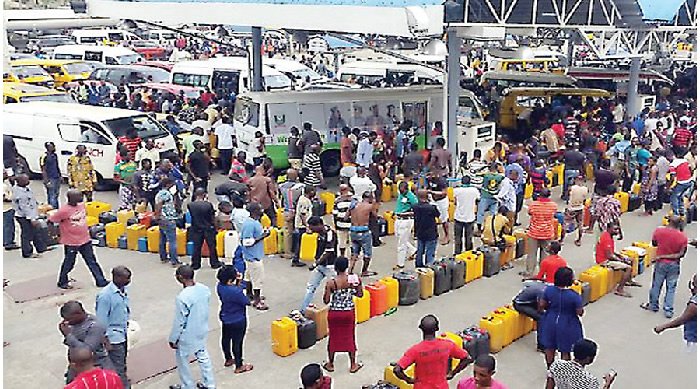The Major Oil Marketers Association of Nigeria, (MOMAN), has attributed the lingering fuel scarcity in the country to high costs of vessels and inadequate trucks to deliver petroleum products from depots to filling stations across Nigeria.

The marketers explained that these high logistics and exchange rate costs continue to put pressure on their operations with ripple effects on the pump price.
In a statement on Friday, the marketers said the fuel queues are caused by exceptionally high demand and bottlenecks in the fuel distribution chain.
“The major cause is the shortage and high (US Dollar) costs of daughter’s vessels for ferrying product from mother vessels to depots along the coast,” it said.
“Next is the inadequate number of trucks to meet the demand to deliver products from depots to filling stations nationwide.”
MOMAN said it sympathises with Nigerians over the challenges they are facing in the purchase of petrol at filling stations across the country.
Over the past three months, it said its staff members have worked diligently at depots and filling stations to relieve the stress faced by Nigerians through the Christmas and New year periods.
“Our members have again agreed to extend depot loading hours as well as keep strategically situated service stations open for longer hours to ease access to fuels for our customers,” the association said.
It noted that it shall continue to use its best endeavours to ensure that product is sold at the pump at prices currently approved by the regulatory authorities, despite pressure on price by demand and costs in immediate operating environment.
“A final resolution to these challenges will be the full deregulation of the petroleum downstream sector to encourage liberalisation of supply and long-term investments in distribution assets. We urge the government to work towards this end goal,” it said.
Scarcity
In recent months, especially since the government announced plans to remove fuel subsidies, Nigerians have had a hard time getting petroleum products at filling stations.
The scarcity has persisted despite the government’s repeated claims it had enough petroleum products in stock. In many parts of the country, operators of filling stations sold at prices higher than the government’s pump price.
The Nigerian government Friday night said it has not approved any increase in the pump prices of petrol across the country.
The Minister of State for Petroleum Resources, Timipre Sylva, made this disclosure even as Nigerians continue to queue for fuel in filling stations amidst reports of increase in the pump price of petroleum products.
Earlier on Thursday, reports claimed that the government quietly approved ₦185 as the new petrol pump price per litre.
But Mr Sylva claimed that President Muhammadu Buhari did not approve any increase in the price of PMS or any other petroleum product.
Volume of petrol lifted by oil marketers dropped by 50% – IPMAN
The Independent Petroleum Marketers Association of Nigeria (IPMAN) had announced that the volume of products supplied to marketers at the loading points has dropped by about 50 per cent.
IPMAN deputy president, Zarma Mustapha, disclosed this while speaking on Channels Television’s Sunrise Daily on Friday.
He said the country is in a complex situation owing to the burden of subsidy that the government is carrying which is no longer sustainable.
He noted that the importation of petroleum products by the Nigerian National Petroleum Company (NNPC), Limited affects the government’s revenues.
“Sometime in July and August, the volume of lifting we had and what we have today has dropped by about 40 per cent or 50 per cent,” Mr Mustapha said.
He noted that the lingering presence of queues at fuel stations across the country could be due to the high cost of the subsidy.
“We are just assuming maybe (it’s because of) the volume of the products they are bringing in; the more the volume, the more the cost of the subsidy.
“It doesn’t seem that they are bringing in more. If they’re bringing in more, we would be having the same volume that we usually get at the loading point.
“As of today, with what is trending at the private depots, the volume available is not enough. The private depots also contribute by not giving the product as it is being regulated by the NNPC,” he said.
He explained further that he had not heard any official statement from NNPC or the industry’s regulatory body, the Nigerian Midstream and Downstream Petroleum Regulatory Authority (NMDPRA), about insufficient supply.
“But with the look of things, [with] what is going on at the loading point, the product is not enough as they usually bring it, supply it to the private depots, and we purchase from the private depots,” he said.
According to him, the NNPC is responsible for importing the products and distributing them to private depots because independent marketers do not have depots.
“Yesterday, I bought a product in Lagos at a depot at N247 per litre to be transported down to the far North… even we as independent marketers don’t really understand what is happening.
“As of yesterday, it is going for about N240 in Lagos, N235 in Warri, and N240 in Port Harcourt. In Calabar, it’s as high as N250 per litre.
“As a marketer, you will buy that product for upward transmission to where your retail outlet is. You’ll transport it yourself,” he said.
In recent months, especially since the government announced plans to remove fuel subsidies, Nigerians have had a hard time getting petroleum products at filling stations. The scarcity has persisted despite the government’s repeated claims it had enough petroleum products in stock. In many parts of the country, operators of filling stations sold at prices higher than the government’s pump price.